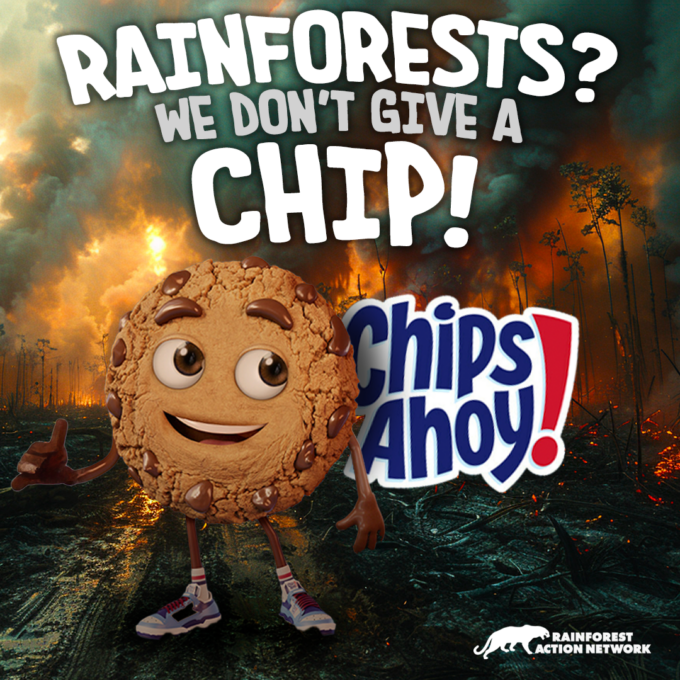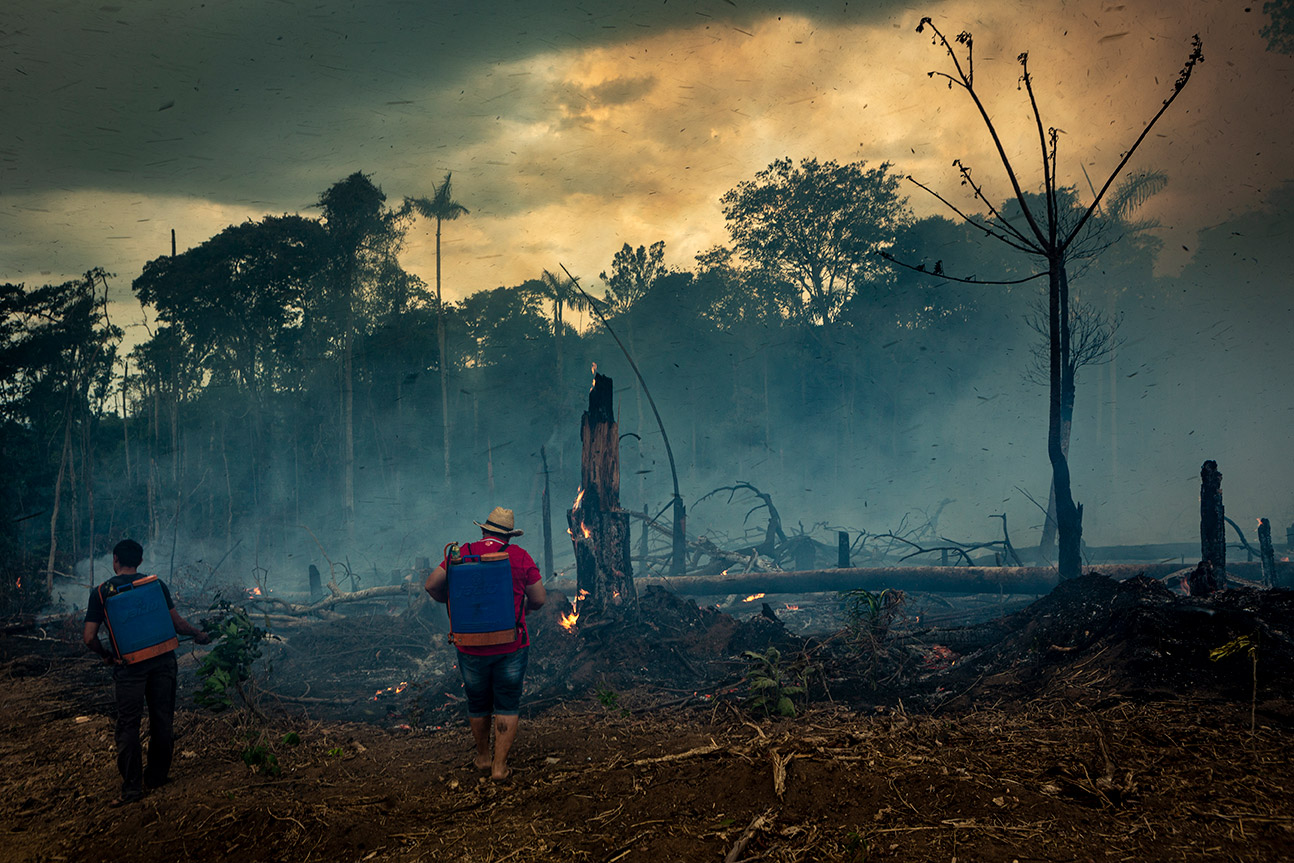We live in a time that calls for urgent action across all sectors, from businesses to civil society organizations, to tackle concurrent biodiversity and climate crises. We know that protecting and restoring forests, through respecting the rights of Indigenous communities to manage their territories, can play an outsized role in addressing the climate crisis. Big corporations can play a significant role in keeping forests standing — agricultural expansion by itself accounts for up to 90% of global deforestation, and human rights defenders continue to face intimidation and violence, with 196 murdered last year.
Global consumer goods companies remain critical drivers of deforestation and human rights violations in supply chains, particularly in producing forest-risk commodities like palm oil, soy, and paper used in packaging. Our annual Keep Forests Standing Scorecard holds some of the world’s largest consumer brands accountable for contributing to deforestation, land rights violations, and increasing threats facing human rights defenders. The ten corporations evaluated are all implicated in ongoing forest destruction and human rights violations worldwide, with only one company, Unilever, barely receiving a passing grade.
Our 2024 scorecard shows that the brands — Colgate-Palmolive, Ferrero, Kao, Mars, Mondelēz, Nestlé, Nissin Foods, PepsiCo, Procter & Gamble, and Unilever — remain far from implementing paper promises to address the growing climate crisis. Below is a summary of how each brand scored in this year’s scorecard.

The Leaders
Of all the ten consumer brands, only Unilever scored a C, the same score it managed last year. In 2024, Unilever became the first brand evaluated in the scorecard to publish a cross-commodity grievance tracker, which it uses to report on its response to suppliers violating the requirements in its cross-commodity No Deforestation, No Peatland and No Exploitation (NDPE) policy. Unilever made progress toward supply chain transparency by publishing detailed supplier lists and its methodology for independently verifying suppliers’ compliance with traceability and deforestation-free requirements.
The Middle of the Pack – moving forward
Colgate-Palmolive led the middle pack with solid progress in key areas. They joined Unilever, Nissin Foods, and Procter & Gamble in publishing a grievance tracker. Though only focused on palm oil grievances, Colgate-Palmolive accepted grievances at the corporate group level (as defined by the Accountability Framework Initiative) and published a list of suspended suppliers. Colgate-Palmolive joined six brands by issuing a public commitment to zero tolerance of intimidation, criminalization, and violence towards Human Rights Defenders. The growing number of commitments to protect Human Rights Defenders is meaningful progress given the increasing threats they face while defending their territories from corporate exploitation. Now, only Mondelēz, Procter & Gamble, and Nissin Foods lack a commitment on Human Rights Defenders protections.
The Middle of the Pack – not moving
Mars has not made any meaningful progress this year. They have yet to publish a list of current grievances, suspend suppliers, or adopt a dedicated Human Rights Defender policy and procedure.
Kao released a forest footprint for part of its palm oil supply chain in Indonesia earlier this year, but it did not make any meaningful progress in improving its score. Despite having a published grievance tracker for smallholders, Kao does not have a tracker for non-compliance cases involving plantation companies, mills, and traders in its palm oil supply chain. Kao continues to rely on certification systems, supplier questionnaires, and self-reporting on compliance instead of undertaking credible independent verification of suppliers’ performance with their cross-commodity NDPE policy.

The Middle of the Pack – moving backward
PepsiCo has moved closer to the laggards than the middle pack. PepsiCo moved backward based on its failure to advance credible independent verification of NDPE policy implementation in its palm oil supply chain or establish methods used to prove that its suppliers are respecting the rights of Indigenous communities to say no to agricultural development on their lands.
Nestlé also moved backward in its score. Nestlé’s new Responsible Sourcing Core Requirements failed to expand the scope of its requirements to a corporate group level, meaning it refuses to hold its suppliers accountable for the harm caused across their operations. It also lacks a commitment to rigorously and independently verify its progress towards its goals of reaching 100% deforestation-free sourcing for meat, palm oil, pulp and paper, soy and sugar by 2022, and for cocoa and coffee by 2025. Despite indicating in their recent pulp disclosure that they have suspended controversial suppliers in Indonesia (APRIL and Asia, Pulp and Paper (APP)), they have not yet disclosed a cross-commodity grievance tracker or suspended supplier list. Nestlé’s reporting on suspended palm oil suppliers is also outdated.
The Laggards
Ferrero, Mondelēz, Nissin Foods, and Procter & Gamble rounded out the bottom of the ten brands we assessed. All four brands scored an “F” and continue to lag behind their peers in policies and actions to address their role in driving deforestation and human rights violations.
Despite continued pressure to do so, Procter & Gamble has not published any updates to its policies this year. Similarly, Nissin Foods has not made any progress despite repeatedly being connected to ongoing deforestation and land rights violations in Indonesia. There is growing public awareness of its role in driving deforestation in Indonesia. In 2024, Nissin Foods once again failed to disclose its forest footprint despite a commitment to do so before 2030.
Ferrero has not made any meaningful progress toward adopting a cross-commodity NDPE policy or mandating adopting an NDPE policy for its suppliers. Ferrero also lacks a commitment to rigorously and independently verify its progress toward its goals of reaching 100% deforestation-free sourcing despite being exposed for making misleading deforestation-free claims.
Mondelēz issued a public statement supporting the European Union Deforestation Regulation (EUDR) but continues to be one of the worst performers amongst global brands. The snack food giant issued a new statement about deforestation, which was scrutinized due to significant shortcomings. Despite their involvement in the Consumer Goods Forum advancing work on Human Rights Defenders, Mondelēz has not published a dedicated Human Rights Defender policy and procedure. Despite being exposed for its connections to suppliers sourcing illegally produced palm oil and human rights violations, they have also not published a grievance tracker to report on actions taken in response to these scandals.
Consumer Brands Stalling at the Wrong Time
This year was billed as a pivotal year with the scheduled implementation of the European Union Deforestation Regulation (EUDR) on December 31, 2024. Tragically, the regulation enforcement was postponed for twelve months, in a decision that came just weeks before its scheduled implementation. In the face of this postponement, some brands have published joint letters supporting the EUDR and lamenting its delay. While we welcome public displays of support of the EUDR, brands need to accompany advocacy efforts with real progress toward achieving deforestation-free products. Most importantly, brands must ensure that the corporations they do business with are not violating the rights of Indigenous People or criminalizing, intimidating, or trying to silence Indigenous communities and Human Rights Defenders.
As the climate crisis accelerates, corporations must align their policies and actions with the urgency of the moment. Forests continue to fall, and frontline communities are under siege. Consumers, investors, and civil society demand more than promises — they demand action from the world’s most influential brands profiting from destruction.
The Keep Forests Standing campaign urges global companies to take immediate, concrete actions to stop the expansion of commodities they source into the world’s last rainforests and ensure protections for Indigenous communities fighting to protect their lands from corporate exploitation. Visit ran.org/kfs-scorecard/ to review the scorecard and the methodology used in the evaluation.













